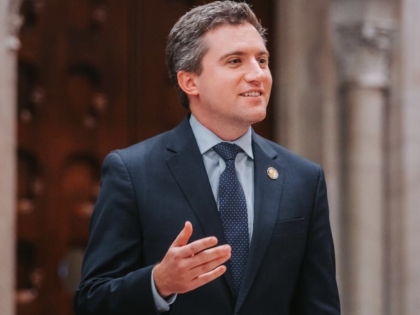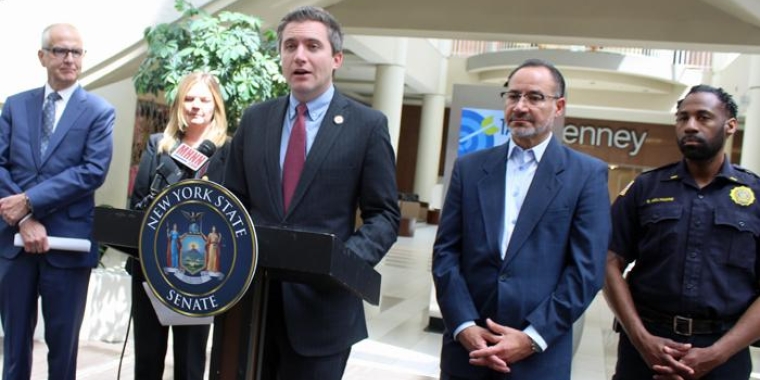
Broadway Tax Credit Could Get Axed In Budget Cuts

The lifeline for Broadway could soon be eliminated.
Introduced in 2021 to help the theatre industry recover during the Covid-19 pandemic, the New York City Musical and Theatrical Production Tax Credit has become an indispensable part of how Broadway shows become profitable. Providing up to $3 million for new shows, the tax credit is now often baked into recoupment schedules, and some star-studded plays are not even able to break-even on Broadway without it.
“It’s an integral part of how we raise money and finance shows now,” stated John Johnson, a producer of the upcoming play Good Night, and Good Luck. The state support can make investing in Broadway musicals and plays seem more attractive, and, “[w]ithout the tax credit, there are years we could be 30% to 40% down in shows, because of the risk profiles of shows and the increasing difficulty of capitalizing them,” echoed Jeff Daniel, the chief strategy officer of the Shubert Organization, which owns 17 Broadway theaters.
But, with Donald Trump set to start his second term as President of the United States next month, New York State lawmakers expect that they will not be able to turn to the federal government for financial help, and they are now looking for areas to cut costs.
One program targeted for the chopping block is the Broadway tax credit.
According to a recent report prepared for the New York State Department of Taxation and Finance, the Philadelphia-based consulting company PFM found that the New York City Musical and Theatrical Production Tax Credit has generated about $15.6 million in state taxes over the past three years. When taking into account that $67.2 million has been dispersed to date, the program has produced a return of 23 cents for every dollar of taxpayer dollars spent.
However, the calculation does not capture the economic impact of tourists that Broadway shows attract to New York City.
According to the Broadway League national trade association, about 64.7 percent of Broadway theatergoers during the 2023 season resided outside of New York City and the surrounding suburbs. The out-of-town visitors spend millions and millions of dollars on hotels, restaurants, transportation, shopping, and other activities which generate tax revenue for the state, which the authors of the report acknowledged are “significant.”
Nevertheless, the Broadway tax credit program is “not delivering value for taxpayers,” complained State Senator James Skoufis, who serves as the chair of the Committee on Investigations and Government Operations. “There is an opportunity cost associated with the program,” he said, and, “most importantly, taxpayers are not getting a positive return on investment.”
Continuing to offer the tax credit program without conducting any further analysis of it, Senator Skoufis said, “would be like throwing money into a stock, losing tremendous value in the stock over the preceding year, and telling yourself, ‘[o]h, well, I like that stock,’ and putting more money into it without any kind of evaluation as to whether it is a smart investment or not.” “We’re policymakers here,” he emphasized, adding that “we shouldn’t be throwing money at things just because we enjoy them.”
Other criticisms of the tax credit program include the fact that, “due to how the program is structured, larger shows, which typically hire more employees, receive a higher share of the tax credit,” wrote the authors of the report.
In addition, the PFM consultants condemned how the tax credit program “does not take the need of the production into account.” “Shows that would have secured funding regardless of the credit’s existence benefit the same as shows that might not have,” the consultants claimed, and some of the state subsidies have gone to the producers and investors of top-grossing Broadway shows.
“It’s just the state giving private companies public money,” grumbled State Senator Sean Ryan.
Further, Broadway ain’t going anywhere,” State Senator Skoufis quipped. “If we end this incentive, then Broadway isn’t going to pick up its stakes and move to Des Moines, Iowa, or New Jersey,” he continued.
“We’ve got a program that is demonstrably an unwise investment, and I think that common sense would dictate that we ought to reevaluate the program, as well as the pennies on the dollar that we get back for the Empire State program,” Senator Skoufis commented.
New York State politicians enacted the Empire State Musical and Theatrical Tax Credit in 2014 to encourage producers to rehearse and present the national touring productions of their Broadway shows upstate. The program reimburses a quarter of qualified production expenses, and it provides up to $8 million in tax credits to productions every year.
But, according to the report from PFM, the upstate tax credit produces a return of only six cents on every taxpayer dollar spent. “While growing the industry in other parts of [New York State] outside of New York City is a worthwhile goal, even when considering qualitative impacts, it does not create a positive return on investment,” the consultants concluded.
However, Hope Knight, the commissioner of Empire State Development, which oversees the tax credit programs, defended the upstate tax credit during the hearing. “Without the tax credit,” she said, “touring productions would go to other places, and we would not get ... $117 million of spend that happened as a result of those productions being in those upstate communities.”
Discussions of the tax credits are expected to continue in the New York State Legislature over the next few months.


